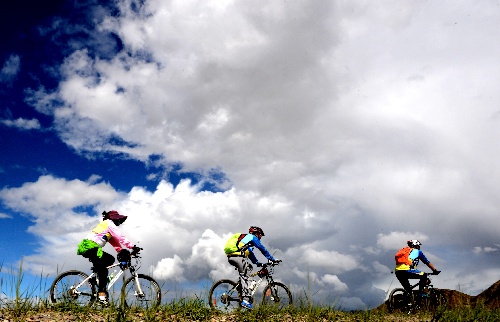
Cycling at high altitudes requires careful attention to various factors to ensure a safe and enjoyable experience. Here are some essential tips:
- The primary focus for preventing altitude sickness is guarding against colds.
- Key to preventing colds is timely adjustment of clothing layers.
- Keep windows slightly open when sleeping at night.
- Ensure there’s drinking water by the bedside for nighttime hydration.
- Avoid loud noises, vigorous jumping, and sudden standing up when at high altitudes. Prolonged squatting should be followed by a gradual rise.
- Wear clothing made of quick-drying fabrics close to the body.
- Insulating layers of clothing should feature zipper closures for easy ventilation and removal.
- Prioritize insulation measures before descending slopes. Half of a separate raincoat’s function is to prevent wind on descents.
- Pay special attention to head insulation when descending slopes.
- Drink hot water on the journey, and it’s essential to have an insulated water bottle.
- If feeling unwell, consider taking a vehicle to lower altitudes for rest. Avoid daily baths when in a cold state.
- Seek medical attention promptly if feeling unwell. Don’t push through discomfort at high altitudes; it’s challenging to overcome.
- Avoid alcohol consumption at high altitudes.
- Cyclists with varying fitness levels should not push beyond their limits. Plan the itinerary at a comfortable pace.
- While cost-cutting is possible on some items, don’t compromise on nutrition. Adequate food intake is crucial for energy and immune system support. Consume fruits such as apples, bananas, and pears.
- Take intermittent breaks during extended downhill rides.
- Keep a safe distance from large trucks when descending, and maintain safe distances between teammates. Avoid overtaking on the road.
- Exercise caution when passing through areas prone to landslides or falling rocks. Confirm safety before proceeding.
- Choose spacious rest areas, avoiding proximity to mountains, cliffs, or rivers.
- Avoid provoking stray dogs, cats, and other animals. Your affection might not be reciprocated!
- Novices should refrain from standing up and rocking the bike. Avoid forceful pedaling on steep slopes, and knee warmth and knee pads are essential.
- Before sleeping, inform family members of your safety. Avoid turning off your phone overnight.
- In emergencies, flag down passing vehicles for assistance or dial emergency services at 110 or 120.
- If the guesthouse experiences a power outage and resorts to a generator, refrain from charging devices to prevent potential damage due to unstable voltage.
- Before departure, secure outdoor insurance for added protection.
- During high-altitude cycling, take timely breaks, balance exertion and rest, and be cautious of potential health issues arising from excessive fatigue.
Teammate Guidelines:
- Teammates must voluntarily join and be at least 18 years old.
- Mutual assistance among teammates is obligatory, and each member should possess the capability to independently complete the cycling goals.
- Each teammate must purchase valid outdoor insurance for the cycling period and share the policy number with family or friends.
- Sign a joint disclaimer with fellow teammates.
- Compile an emergency contact list with the phone numbers of each teammate’s family.
- In case of an accident, notify emergency services promptly and inform the teammate’s family without delay.
- If teammates get separated, ensure personal safety first, and promptly inform the rest of the group to prevent unnecessary worry.

